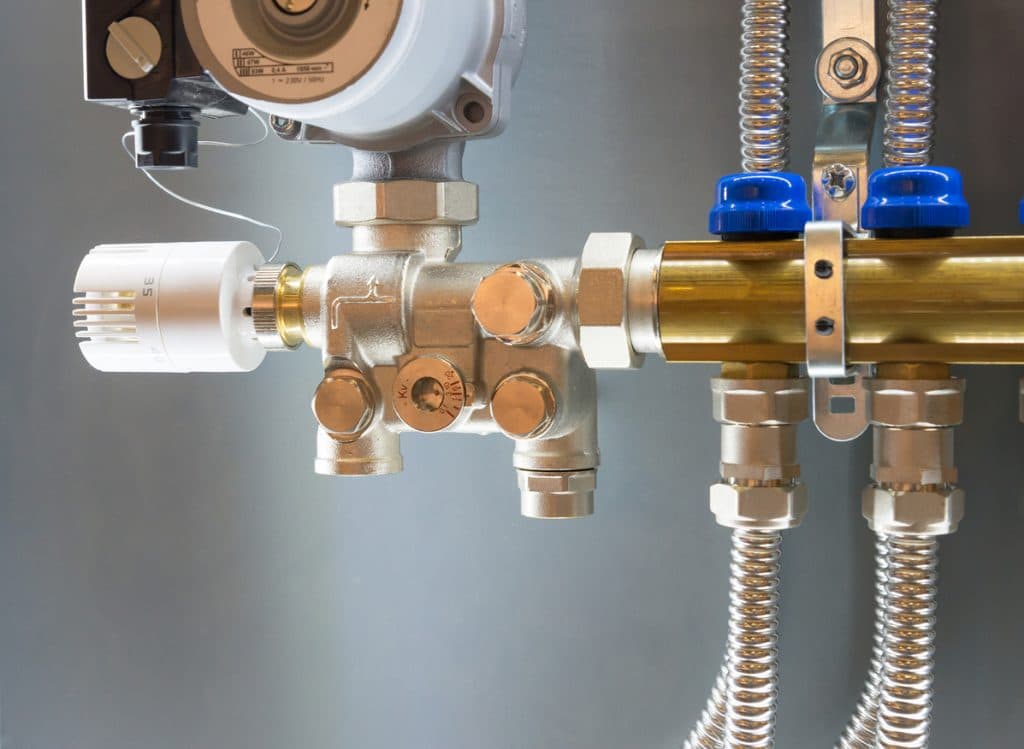As a licensed Portland home energy score assessor, one of the most common questions I get before scoring someone’s home is “do my energy-efficient appliances count?”
The answer, unfortunately, is that we are not able to reflect energy efficient kitchen appliances into home energy scores in Portland. The scoring methodology set by the US Department of Energy tries to establish a baseline for energy usage in the home, and all households use energy differently.
One item that does factor into your home energy score is the hot water heater. In this article, we will discuss the available options for upgrading your hot water heater to potentially improve your home energy score, and how to do it.
What the EF? Common questions about hot water heater ratings
- The Department of Energy’s efficiency rating for hot water heaters has recently changed, so if you’re in the market for a new one, be sure you know the difference between EF and UEF!
- Okay, what is it? Energy Factor, or EF, is now UEF, or Universal Energy Factor. Like the milage rating on a car, they attempt to give an easy comparison of hot water heaters across styles, brands and models.
- Unfortunately, EF and UEF are measured differently, so one number will not compare to another.
- If my hot water heater just has an EF, will that affect my score? No, your Portland Home Energy Score assessor can use either rating in the scoring system.
- How much UEF do I need? The higher the UEF, the more efficient the water heater. If the unit qualifies for an Energy Star rating (which will be labeled with a large sticker on the hot water heater itself), it has a higher-than-average UEF. For an exact chart of minimum UEF ratings for different types of hot water heaters, visit the Energy Star website.
Going Tankless
This sounds like more of a summer-apparel topic, but if you’ve been shopping for hot water heaters for your Portland home you’ve probably learned that there are two basic types: Those with tanks, and those without. Tankless hot water heaters, also known as instant or on-demand hot water heaters, hit the market several years ago but they’re gaining in popularity as homeowners prioritize high efficiency.
Tankless hot water heaters are a neat invention: Super-heated coils wrap around a metal pipe carrying water. As the water passes through, it gets hot, and is instantly piped to the place in the house you need it. While traditional tank-style hot water heaters can take up a lot of space and lose efficiency the longer the hot water sits around, instant hot water heaters are small, wall-mounted, and make as much hot water as you can use.
The US DOE estimates that on-demand hot water heaters can be up to 34% more efficient than conventional storage tank hot water heaters, depending on how much water your household uses. Although they can cost more up front, they have a longer life expectancy than tank hot water heaters, and parts are more easily replaceable. However, there is a problem with tankless hot water heaters in Portland, the ground water here is really cold – really cold compared to other parts of the country. This means the tankless water heater is not nearly as efficient as a homeowner would expect it to be.
The Home Energy Score Payback
If you’re trying to decide what kind of water heater to buy, there are a few cost/benefit questions to ask yourself, and if you live in Portland, your future Home Energy Score should be one factor to include.
- Functionality. Maybe you aren’t going to move for a couple more years, so your home energy score is not the first thing on your mind. You want a hot water heater that meets your family’s needs. When shopping, you’ll want to look at not just price but also the storage capacity of the hot water heater (tank versions) or the output flow rate for tankless hot water heaters.
- Costs. For up-front costs, high efficiency hot water heaters are easy to comparison-shop, but the factor that homeowners often overlook is installation. Especially in a city like Portland, where the price of labor is steep, the more complicated the job, the more it’s going to cost. In hot-water-heater-speak, that means replacing a 50-gallon tank with a newer but otherwise identical version will run a few hundred dollars. But, if converting from a tanked to a tankless hot water heater, installation costs will be more, especially if a new gas line is being run. A tankless hot water heater, with installation, can sometimes cost as much as $3,000, according to homeadvisor.com.
- Home Energy Score Boost. It’s not easy to say exactly how much a new, high-efficiency hot water heater will affect your home energy score — so much depends upon the other features of your home. However, an Energy Star-rated hot water heater is definitely recommended, and instant hot water heaters likely get a bit of extra credit under the current Home Energy Report scoring guidelines.
DIY Installation Considerations
Generally, installing a tankless hot water heater without a licensed contractor is not recommended. Even if you already have electrical, plumbing and gas-line experience (if the unit uses natural gas or propane), these units themselves often have specific installation requirements that aren’t covered by DIY guides.
On the other hand, many people replace tank hot water heaters as a DIY project, and the biggest hurdle is probably moving the heavy, awkward units in and out of the house. Here are some tips to keep in mind if you’re installing a new tank-style hot water heater.
- Don’t put it off. If your hot water heater tank has sprung a leak, it’s only going to get worse. As soon as you can, shut of water to the unit, drain it using the drain valve and a hose, and find a new hot water heater.
- Shop for a new hot water heater that is the same height as your current one, to avoid having to change the length of the water, gas or electrical lines.
- You’ll need a plumbing permit from the City of Portland.
- Plan for four to six hours to complete the installation — assuming you have all the tools on hand already.
- Portland is retrofitting for seismic activity — you should too. If you haven’t secured your hot water heater to the wall in the past because the location did not allow you to do so, consider installing the new hot water heater in another location. In this case, you’ll want to call the pros, but you will be glad you did if a big earthquake hits.
- Read a couple of guides before getting started. Try The Family Handyman or This Old House.

